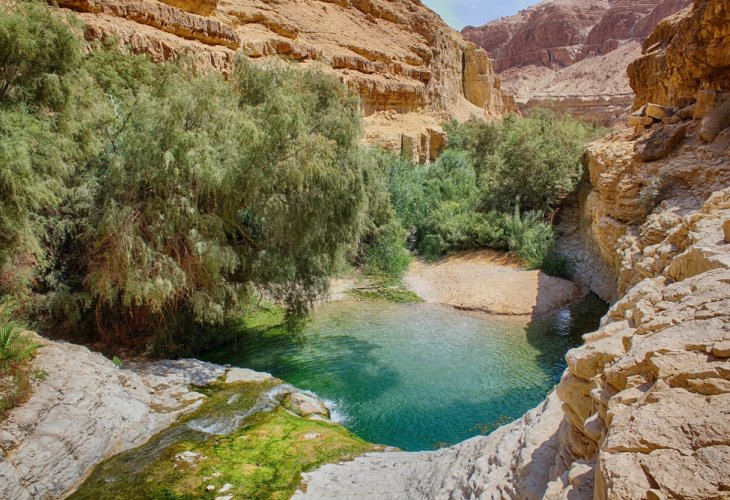The Hidden Secret Unearthed in Ein Gedi
Experts gathered around the discovery site, slowly revealing the full inscription. Found to be part of a mosaic floor of Ein Gedi’s ancient synagogue, the text carried warnings, threats, and a secret.
 Ein Gedi (Photo: shutterstock)
Ein Gedi (Photo: shutterstock)In the summer of 1970, an archaeological dig took place at the ancient site of Ein Gedi, an important city during the Second Temple period. It is located on the shores of the Dead Sea (which, unfortunately, has receded over time) at the foot of today's Kibbutz Ein Gedi. The excavation was progressing slowly. Dozens of workers were hunched over the ground throughout the site, each carefully scraping the soil layers, until suddenly there was a breakthrough: one of the diggers exclaimed, "I've found an inscription!"
All the experts gathered around the location, slowly revealing the entire inscription. It was later revealed to be part of a mosaic floor that served as the synagogue of Ein Gedi (years later, burnt remnants of a Torah scroll from the community, specifically parts of the Book of Leviticus, were also found and deciphered using advanced technology).
The intriguing aspect of this inscription was that it contained warnings, threats, and a secret, saying: "Anyone who causes discord between a man and his friend or speaks slander about his friend to the gentiles, or steals his friend's belongings, or reveals the city's secret to the gentiles – the One whose eyes wander throughout the land and sees the hidden, will set His face against that person and his descendants and uproot them from beneath the heavens."
It's all logical, but what is the "city's secret"? And why do such severe curses apply to those who reveal it?
Most researchers concluded that this secret was the process of producing balsam oil, which was the professional secret of the residents of Ein Gedi and their livelihood. Balsam oil was likely the "balm," an element of the incense, a component of the anointing oil, and also the base for perfumes sold in many countries. It all originated from a plant that grew uniquely in the hot and dry climate of Ein Gedi, which was the source of balsam oil production for over a thousand years. Anyone who revealed this professional secret would cause competition—other people in the area would begin growing balsam and producing oil, affecting the livelihood of Ein Gedi's residents.
Josephus describes the Dead Sea and writes: "There is found the balsam tree, the most precious of all the fruits in that land. And rightly may one say that this land is a paradise." The historian Diodorus of Sicily, living about 1,900 years ago, writes: "In these regions, in a certain valley, there is a tree called Balsamon, from which substantial revenue is received. It is used for medicinal purposes and is highly valued by physicians" (balsam was later corrupted to "balm"). According to the Tanna Rabbi Judah, those who use balsam oil should recite the blessing "Creator of the oil of our land," as, like the fruits for which Israel was praised, it is a unique creation that requires a separate blessing.
Balsam imitations existed. Farmers in Syria attempted to grow it as well, but experts warned against the imitations... The Greek physician Galen writes: "The best balsam is the Jewish variety, and of all the balsam, the Ein Gedi variety is the best, being of superior quality to those grown elsewhere in Palestine."
When the Romans conquered the Land of Israel, they tried to extract the secret of balsam production, but the people of Ein Gedi did not yield. Instead, they offered to supply balsam to the Romans, who accepted the offer. Cleopatra of Egypt desired the balsam perfume for herself and demanded supply from her friend, Emperor Mark Antony. Such was the value of the balsam oil produced by the Jews in Ein Gedi, illustrating the great care taken to prevent the disclosure of their significant secret.
In 2008, farmers from Kibbutz Almog near the Dead Sea succeeded in cracking the "city's secret" and produced balsam oil from the ancient balsam tree. It is hoped that none will steal their secret and certainly not reveal it to the Romans...

